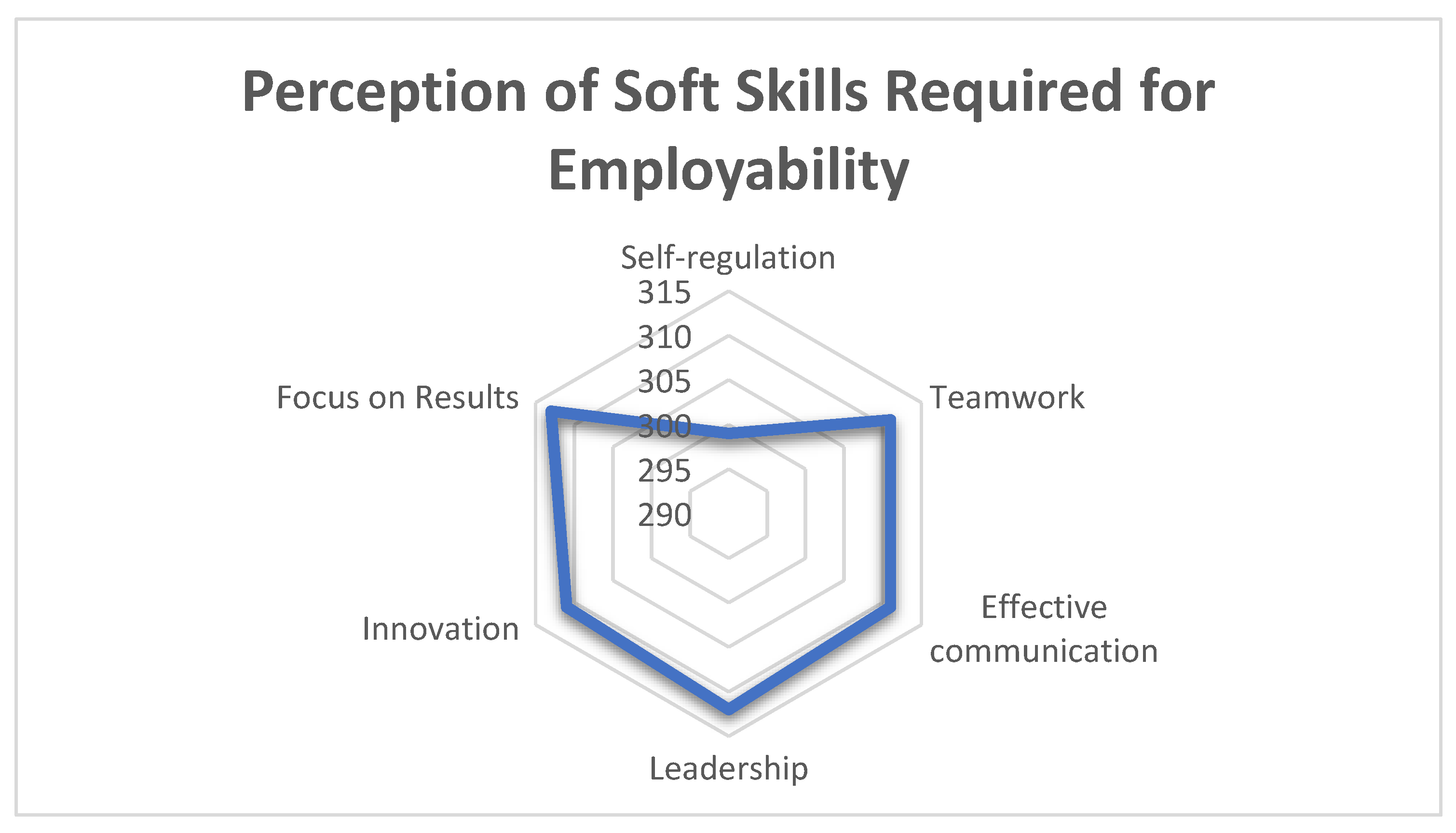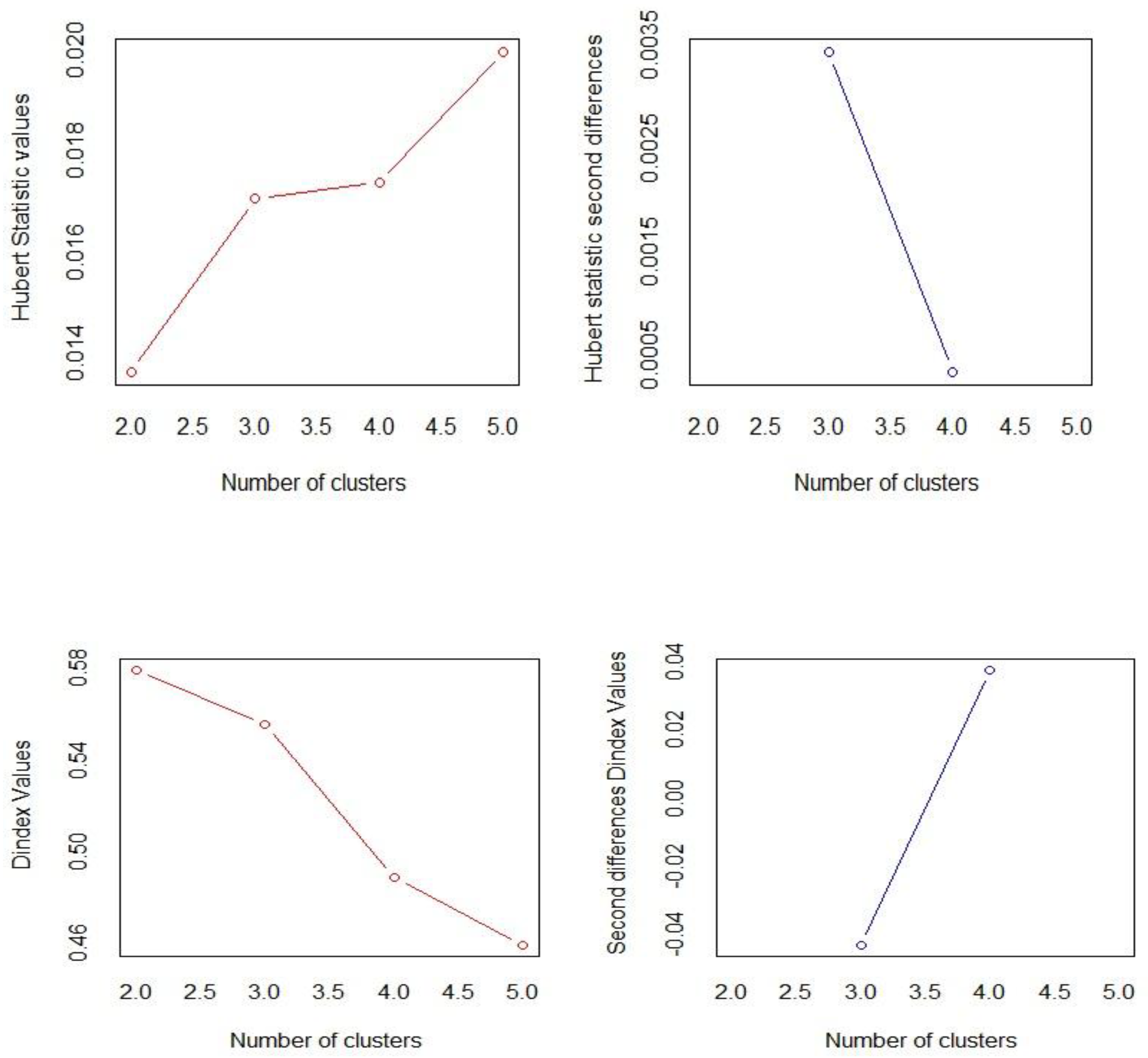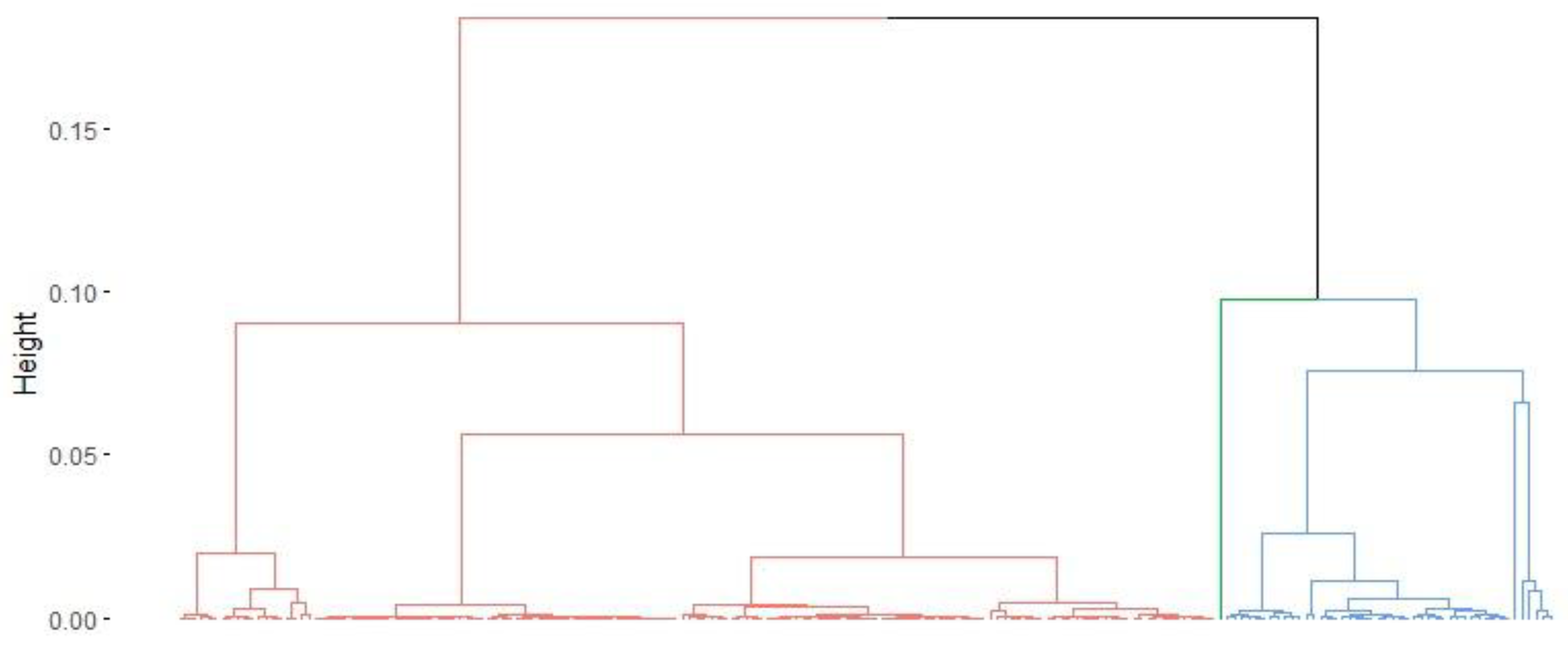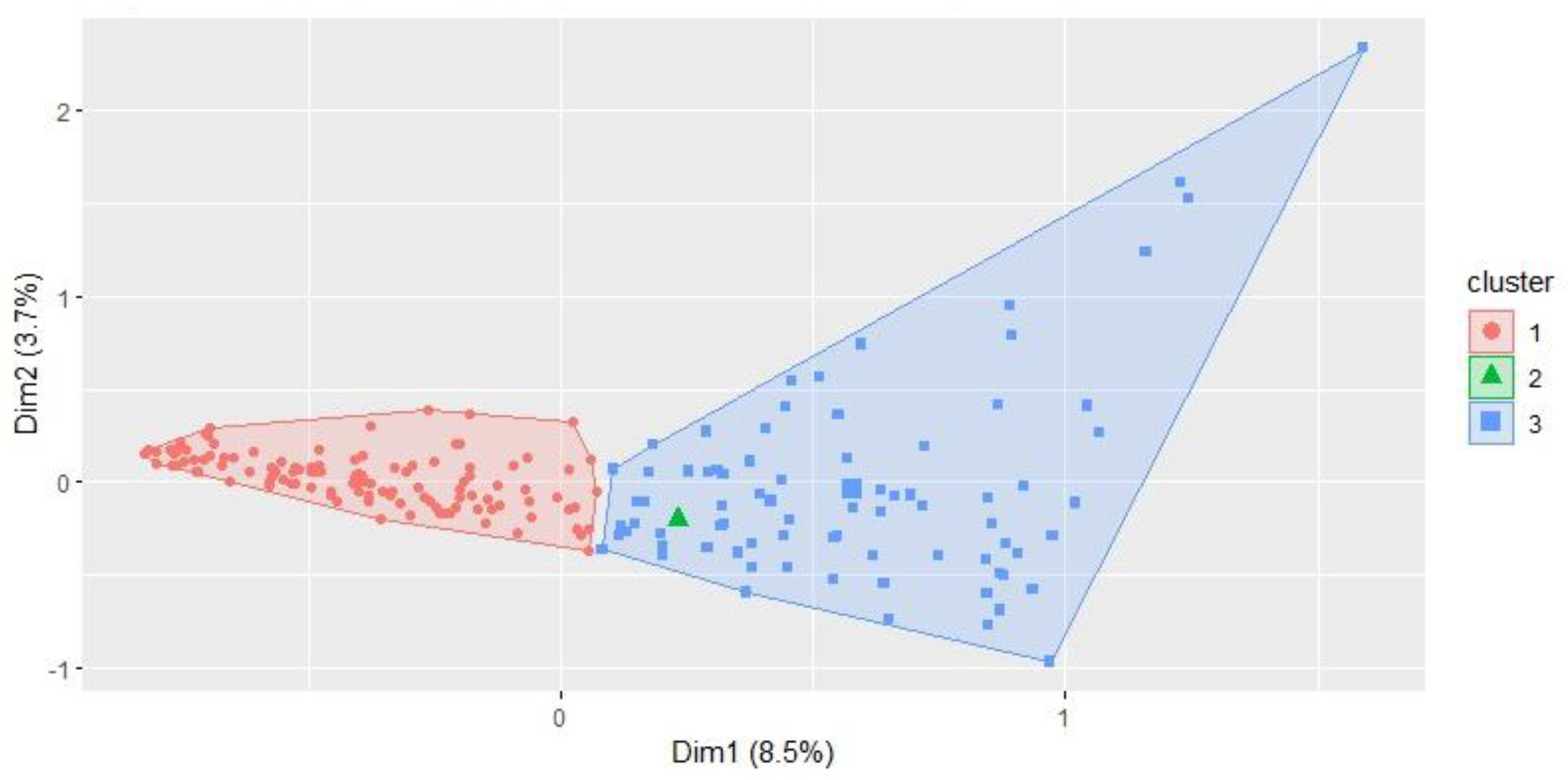Soft Skills and Employability of Online Graduate Students
Abstract
1. Introduction
2. Theoretical Background
Research Questions
- What are master’s students’ perceptions regarding the importance of soft skills, for their employability and professional development?
- How do online graduate students cluster and differentiate based on the development of studied soft skills using cluster analysis?
3. Materials and Methods
4. Results
4.1. Socioeconomic Analysis
4.2. Perception Regarding Employability
4.3. Clusters and Cluster Analysis
4.4. Characterization of the Clusters
4.5. Cluster One: Self-Regulation, Effective Communication, Leadership, and Innovation
4.6. Cluster Two: Demotivation, Outlier
4.7. Cluster Three: Self-Regulation, Effective Communication, Leadership, and Innovation
4.8. Demographic Characteristics and Valuation of Soft Skills
- –
- Students in finance programs (mainly in Cluster One) tend to highly value self-management, effective communication, leadership, and innovation. This may be related to the competitive and dynamic nature of the financial sector, which requires strong leadership and management skills.
- –
- Students in education and technology programs (predominantly in Group 3) moderately value these same skills, possibly due to the need to apply them in teaching and technology development contexts, where innovation and effective communication are essential but not as strongly required as in the financial sector.
5. Discussion
6. Conclusions
Author Contributions
Funding
Institutional Review Board Statement
Informed Consent Statement
Data Availability Statement
Acknowledgments
Conflicts of Interest
References
- Fajaryati, N.; Budiyono, B.; Akhyar, M.; Wiranto, W. The Employability Skills Needed to Face the Demands of Work in the Future: Systematic Literature Reviews. Open Eng. 2020, 10, 595–603. [Google Scholar] [CrossRef]
- Ricchiardi, P.; Emanuel, F. Soft Skill Assessment in Higher Education. J. Educ. Cult. Psychol. Stud. 2018, 18, 21–53. [Google Scholar] [CrossRef]
- Kraja, Y.B.; Bejleri, E.; Saraçi, P. Soft Skills and Hard Skills Their Impact on Employment in Urban and Rural Areas. J. Law Sustain. Dev. 2023, 11, 1–14. [Google Scholar] [CrossRef]
- Klepikova, A.G.; Kormakova, V.N.; Eroshenkova, E.I.; Musaelian, E.N. Development of Online Master’s Degree Course in Education Digitalization Conditions: On BSU Experience. KnE Soc. Sci. 2021, 2020, 146–158. [Google Scholar] [CrossRef]
- Ummatqul Qizi, K.N. Soft Skills Development in Higher Education. Univ. J. Educ. Res. 2020, 8, 1916–1925. [Google Scholar] [CrossRef]
- Carter, M.A.; Lundberg, A.; Geerlings, L.R.C.; Bhati, A. Shifting Landscapes in Higher Education: A Case Study of Transferable Skills and a Networked Classroom in South-East Asia. Asia Pacific J. Educ. 2019, 39, 436–450. [Google Scholar] [CrossRef]
- Ludwig, S.C. Higher Learning: Lessons from an Online Advocate. Vopr. Obraz. Educ. Stud. Moscow 2018, 4, 167–187. [Google Scholar] [CrossRef]
- Barnard, L.; Paton, V.; Lan, W. Online Self-Regulatory Learning Behaviors as a Mediator in the Relationship between Online Course Perceptions with Achievement. Int. Rev. Res. Open Distance Learn. 2008, 9, 1–11. [Google Scholar] [CrossRef]
- Bennett, R. Employers’ Demands for Personal Transferable Skills in Graduates: A Content Analysis of 1000 Job Advertisements and an Associated Empirical Study. J. Vocat. Educ. Train. 2002, 54, 457–476. [Google Scholar] [CrossRef]
- Velasco, M.S. More than Just Good Grades: Candidates’ Perceptions about the Skills and Attributes Employers Seek in New Graduates. J. Bus. Econ. Manag. 2012, 13, 499–517. [Google Scholar] [CrossRef]
- Kuregyan, A.L.; Khusainova, M.A. Soft Skills as Key Competences for Successful Employability of Graduate Students. Vestn. Samara State Tech. Univ. Psychol. Pedagog. Sci. 2022, 19, 113–120. [Google Scholar] [CrossRef]
- Cinque, M.; Kippels, S. Soft Skills in Education: The Role of the Curriculum, Teachers, and Assessments Regional Center for Educational Planning, 1st ed.; UNESCO: Abu Dhabi, United Arab Emirates, 2023; pp. 1–37. [Google Scholar]
- Tang, K.N. Beyond Employability: Embedding Soft Skills in Higher Education. Turk. Online J. Educ. Technol. 2019, 18, 1–9. [Google Scholar]
- Capogna, S. Empowerment Organizzativo e Competenze Trasversali Tra Retorica e Virtù. Svilupp. Organ. 2019, 1, 82–91. [Google Scholar]
- Chandhok, S. Roles of Soft Skills in Employability and Professional Advancement: An Analytical Study. Int. Trans. J. Eng. 2021, 12, 1–10. [Google Scholar] [CrossRef]
- Labzina, P.G.; Menshenina, S.G. The Hermeneutic Approach as a Methodological Basis for the Development of Soft Skills in Technical University Students. Vestn. Samara State Tech. Univ. Psychol. Pedag. Sci. 2019, 4, 117–136. [Google Scholar] [CrossRef]
- Cristobal, A.; Quispe, F. Impact of Postgraduate Studies on the Professional Skills of Graduates Impacto de Los Estudios de Profesionales de Los Titulados Habilidades Profissionais Dos Graduados. Mendive Rev. Educ. 2022, 20, 93–104. [Google Scholar]
- Saavedra, M.G. Posgrados y Demandas Laborales: La Evaluación de Los Profesionales. Rev. Iberoam. Educ. 2006, 38, 1–15. [Google Scholar] [CrossRef]
- Crispín, M.L.; Doria, M.; Rivera, A.; Garza, M.; Carrillo, S.; Guerrero, G.; Patiño, H. Aprendizaje Autónomo: Orientaciones Para La Docencia, 1st ed.; Clacso, Universidad Iberoaméricana: Mexico City, Mexico, 2011; pp. 1–247. [Google Scholar]
- Guerra-Reyes, F.; Naranjo-Toro, M. Modelo Educativo, 2nd ed.; UTN: Ibarra, Ecuador, 2020; pp. 1–126. [Google Scholar]
- Román, M. Virtual Education in Graduate Programs. In Proceedings of the Digital World Learning Conference CIEV, Guatemala, 20 November 2018. [Google Scholar]
- World Health Organization. Life Skills Education in Schools (WHO/MNH/PSF/93. A Rev. 1) WHO; WHO: Geneva, Switzerland, 1993. [Google Scholar]
- Di Francesco, G. Unità Capitalizzabili e Crediti Formativi. Metodologie e Strumenti Di Lavoro. Milano Fr. Angeli 1998, 73, 1–140. [Google Scholar]
- Proyect Tuning. Tuning America Latina, 1st ed.; Beneiton, P., Ed.; Alfa Europeaid: Bilbao, Spain, 2007; ISBN 9788578110796. [Google Scholar]
- UE Recomendación Del Parlamento Europeo y Del Consejo. Available online: https://bit.ly/3WsQ6Jl (accessed on 15 April 2024).
- European Commissionr Employment, S.A. Inclusion Transferability of Skills across Economic Sectors—Role and Importance for Employment at European Level; Publications Office: Luxembourg, 2011. [Google Scholar]
- European Commission. Transferability of Skills across Economic Sectors—Role and Importance for Employment at European Level, 1st ed.; European Union: Luxembourg, 2011; pp. 1–96. [Google Scholar]
- Ananiadou, K.; Claro, M. 21st Century Skills and Competences for New Millennium Learners in OECD Countries, 1st ed.; Education Working Papers; OECD: Paris, France, 2009; pp. 1–34. [Google Scholar]
- Davies, A.; Fidler, D.; Gorbis, M. Future Work Skills 2020, 1st ed.; Research Institute, University of Phoenix: Phoenix, AZ, USA, 2011; pp. 1–14. [Google Scholar]
- OCDE. Estrategia de Competencias de La OCDE 2019, 21st ed.; Santillana, F., Ed.; OCDE: Madrid, Spain, 2019; ISBN 9788468057552. [Google Scholar]
- Manpower Group ¿Por Qué Son Necesarias Las Habilidades Blandas? Available online: https://workforce-resources.manpowergroup.com/skills/why-soft-skills-are-hot-skills (accessed on 11 March 2024).
- Raciti, P. La Medición de Las Competencias Transversales En Colombia: Una Propuesta Metodológica, 9th ed.; Eurosocial, Ed.; Programa EurosociAL: Medellin, Colombia, 2015; ISBN 9788899592011. [Google Scholar]
- Silva, S.; Ulloa-Cazarez, R. Soft Skills in Education: Montessori Education for Life and Online Higher Education. In Soft Skills for Human Centered Management and Global Sustainability; Lepeley, M.-T., Ed.; Taylor & Francis group: New York, NY, USA, 2021; ISBN 9780367556402. [Google Scholar]
- Chaudhari, T. Soft Skills: Types, Characteristics and Importance. J. Commer. Trade 2021, 16, 9–12. [Google Scholar] [CrossRef]
- Cimatti, B. Definition, Development, Assessment of Soft Skills and Their Role for the Quality of Organizations and Enterprises. Int. J. Qual. Res. 2016, 10, 97–130. [Google Scholar] [CrossRef]
- Cesare Grisi Soft Skills: A Close Link between Business and Ethics|WiLL©-WORKING THE LIFE–LAB. Available online: https://www.willaboratory.com/soft-skills-a-close-link-between-business-and-ethics-2/ (accessed on 1 March 2024).
- Bernstein, B.L.; Evans, B.; Fyffe, J.; Halai, N.; Hall, F.L.; Jensen, H.S.; Marsh, H.; Ortega, S. The Continuing Evolution of the Research Doctorate; Brill: Leiden, The Netherlands, 2014; pp. 5–30. ISBN 9789462095694. [Google Scholar]
- Snape, P. Enduring Learning: Integrating C21st Soft Skills through Technology Education. Des. Technol. Educ. Int. J. 2017, 22, 1–13. [Google Scholar]
- Laguna-Sánchez, P.; Abad, P.; de la Fuente-Cabrero, C.; Calero, R. A University Training Programme for Acquiring Entrepreneurial and Transversal Employability Skills, a Students’ Assessment. Sustainability 2020, 12, 796. [Google Scholar] [CrossRef]
- USAID. Soft Skills Development to Advance Student-Centered Higher Education, 1st ed.; From the American People, EEUU; USAID: Washington, DC, USA, 2022; pp. 1–21. [Google Scholar]
- García, M.G.; López, C.B.; Molina, E.C.; Casas, E.E.; Morales, Y.A.R. Development and Evaluation of the Team Work Skill in University Contexts. Are Virtual Environments Effective? Int. J. Educ. Technol. High. Educ. 2016, 13, 5. [Google Scholar] [CrossRef]
- Petrie, C.; García-Millán, C.; Mateo-Berganza, M. Escuelas Del Siglo XXI En América Latina y El Caribe, 1st ed.; BID, Banco Interamericano de Desarrollo: Washington, DC, USA, 2021; pp. 1–82. [Google Scholar]
- Sá, M.J.; Serpa, S. Higher Education as a Promoter of Soft Skills in a Sustainable Society 5.0. J. Curric. Teach. 2022, 11, 1–12. [Google Scholar] [CrossRef]
- Caggiano, V.; Schleutker, K.; Petrone, L.; González-Bernal, J. Towards Identifying the Soft Skills Needed in Curricula: Finnish and Italian Students’ Self-Evaluations Indicate Differences between Groups. Sustainability 2020, 12, 4031. [Google Scholar] [CrossRef]
- Richie, K.; Pragman, C.; Bowyer, S. Comparison of Perceived Needed Soft Skills of Undergraduate, Non-Traditional, Online Business Students to Employers’ Desired Soft Skills of Employees. J. High. Educ. Theory Pract. 2022, 22, 174–189. [Google Scholar] [CrossRef]
- Stewart, C.; Wall, A.; Marciniec, S. Mixed Signals: Do College Graduates Have the Soft Skills That Employers Want? Compet. Forum 2016, 14, 276–281. [Google Scholar]
- Pazil, A.H.M.; Razak, R.C. Perspectives of Asian Employers on Graduates’ Soft Skills: A Systematic Review. Univ. J. Educ. Res. 2019, 7, 2397–2405. [Google Scholar] [CrossRef]
- del Pilar García-Chitiva, M.; Correa, J.C. Soft Skills Centrality in Graduate Studies Offerings. Stud. High. Educ. 2023, 49, 956–980. [Google Scholar] [CrossRef]
- Naciones Unidas La Agenda 2030 y Los Objetivos de Desarrollo Sostenible Una Oportunidad Para América Latina y El Caribe, 6th ed; Alicia, B., Ed.; Naciones Unidas: Santiago, Chile, 2018; ISBN 978-92-1-058643-6. [Google Scholar]
- OIT. Manual de Orientiaciones Metodológicas Para Desarrollo de Competencias de Empleabilidad, 1st ed.; OIT, Organización Internacional del Trabajo: Montevideo, Uruguay, 2020; pp. 1–225. [Google Scholar]
- Gray, A. The 10 Skills You Need to Thrive in the Fourth Industrial Revolution|World Economic Forum. Available online: https://www.weforum.org/agenda/2016/01/the-10-skills-you-need-to-thrive-in-the-fourth-industrial-revolution/ (accessed on 29 February 2024).
- Bera Guía Ética Para La Investigación Educativa, Cuarta Edición (2018)|BERA. Available online: https://www.bera.ac.uk/publication/guia-etica-para-la-investigacion-educativa-cuarta-edicion-2018 (accessed on 26 March 2024).
- Everitt, B.S.; Dunn, G. Multivariate Data and Multivariate Statistics. Appl. Multivar. Data Anal. 2001, 1, 1–8. [Google Scholar] [CrossRef]
- Rencher, A.C.; William, F.C. Methods of Multivariate Analysis, 3rd ed.; UTAH, Department of Statistics: Salt Lake City, UT, USA, 2012; pp. 1–758. [Google Scholar]
- Johnson, R.A.; Wichern, D.W. Applied Multivariate Statistical Analysis, 6th ed.; Pearson: Prentice Hall, NJ, USA, 2007; pp. 1–395. [Google Scholar]
- Pérez, C. Técnicas de Análisis Multivariante de Datos, 1st ed.; Perason: Madrid, Spain, 2004; pp. 1–672. [Google Scholar]
- Abdullah, A.R.; Muhammad, M.Z.; Md Nasir, N.A. The Role of Soft Skills within Business Students towards Graduate Employability. J. Entrep. Bus. 2019, 7, 83–94. [Google Scholar] [CrossRef]
- Volkova, N.; Zinukova, N.; Vlasenko, K.; Korobeinikova, T. Development and Mastery of Soft Skills among Graduate Students. Ukr. J. Educ. Stud. Inf. Technol. 2022, 10, 1–14. [Google Scholar] [CrossRef]
- Hagen, M.; Bouchard, D. Developing and Improving Student Non-Technical Skills in IT Education: A Literature Review and Model. Informatics 2016, 3, 7. [Google Scholar] [CrossRef]
- Succi, C.; Canovi, M. Soft Skills to Enhance Graduate Employability: Comparing Students and Employers’ Perceptions. Stud. High. Educ. 2020, 45, 1834–1847. [Google Scholar] [CrossRef]




| Personal | Social | Methodological |
|---|---|---|
| Learning skills | Communication | Creativity and innovation |
| Commitment | Customer orientation | Decision making |
| Professional ethics | Teamwork | Management skills |
| Tolerance to stress | Leadership | Adaptability to change |
| Self-awareness | Negotiation | Result orientation |
| Self-balance | Conflict management | Continuous improvement |
| Cultural adaptability | Networking | |
| Research and management skills |
| Self-Regulation |
| A1. I plan and organize my academic tasks. |
| A2. I feel confident setting goals and following a study plan. |
| A3. I stay motivated and meet deadlines. |
| A4. I am able to manage stress during assessment periods or assignments. |
| A5. I maintain a balance between my online academic life with my work and family. |
| A6. I am persistent in getting help from the instructor through the means of communication established by the online master’s program. |
| Effective Communication |
| C1. I am comfortable interacting with my online professors and peers. |
| C2. I participate in online discussions and contribute to academic debates. |
| C3. When I use my communication skills I resolve a conflict and reach an agreement. |
| C4. I make sure that my messages are understood in the virtual environment. |
| C5. I adjust my tone of voice, pace, and gestures when communicating in the virtual environment. |
| Leadership |
| L1. I have served as a leader in some project or online study group |
| L2. I lead and motivate the team to achieve results. |
| L3. I feel comfortable leading my colleagues in the academic environment. |
| L4. I have the ability to resolve conflicts and maintain harmony in the team. |
| L5. I assume responsibility for the results and success of a project. |
| L6. I value the contributions made by my team members. |
| Teamwork |
| T1. I have worked in virtual teams during my online master’s program. |
| T2. I make sure that all team members collaborate in the different academic activities. |
| T3. I am willing to compromise on my opinions when necessary for the good of the team. |
| T4. I am willing to compromise on my opinions when necessary for the good of the team. |
| T5. I adopt the teamwork approach as a means to achieve results. |
| Innovation |
| I1. I have participated in online academic projects that require creative solutions or novel approaches. |
| I2. I am willing to try new ways of learning. |
| I3. I investigate new self-learning strategies |
| I4. I am motivated by challenges and problems that require creative solutions. |
| I5. I am willing to try new ways of approaching problems, even if they are different from conventional ones. |
| Focus on Results |
| E1. I am committed to clear goals and objectives. |
| E2. I am very persistent and do not give up easily, even when faced with obstacles. |
| E3. My main focus is to achieve measurable and tangible results. |
| E4. I look for opportunities to learn and improve based on results. |
| E5. I take responsibility for results and seek solutions when things do not go according to plan. |
| Relation to Employability |
| RE1. Do you consider that your level of soft skills may influence your future employability? |
| RE2. Have you participated in internship programs related to your field of study during your online program? |
| RE3. Do you believe that your online training can provide advantages in your job search? |
| RE4. I can apply what I learn in my online master’s program directly to my job, which benefits my career. |
| RE5. Which of the following soft skills do you think are important for employability? Select up to three |
| Variable | Description | Frequencies | % of Total | % of Cumulative |
|---|---|---|---|---|
| Sex | Male | 82 | 42.7% | 42.7% |
| Female | 110 | 57.3% | 100.0% | |
| Marital Status | Married | 67 | 34.9% | 34.9% |
| Divorced | 14 | 7.3% | 42.2% | |
| Single | 98 | 51.0% | 93.2% | |
| Unmarried | 13 | 6.8% | 100.0% | |
| Age | Average | 35 years old | ||
| Educational Level | Master’s Degree | 29 | 15.1% | 15.1% |
| Third Level | 163 | 84.9% | 100.0% | |
| Master’s Degree Program | Business Administration with mention in competitiveness and quality management | 21 | 10.9% | 10.9% |
| Visual Arts | 12 | 6.3% | 17.2% | |
| Computer Science with mention in Computer Security | 13 | 6.8% | 24.0% | |
| Communication, mention in Digital Communication | 11 | 5.7% | 29.7% | |
| Local Development with specialization in social and solidarity economy projects | 15 | 7.8% | 37.5% | |
| Finance, with mention in Financial Management | 27 | 14.1% | 51.6% | |
| Occupational Health and Hygiene | 59 | 30.7% | 82.3% | |
| Educational Technology and Innovation | 34 | 17.7% | 100.0% | |
| Module | Fifth | 43 | 22.4% | 22.4% |
| Sixth | 55 | 28.6% | 51.0% | |
| Seventh | 94 | 49.0% | 100.0% | |
| Type of employment | Private employee | 80 | 41.7% | 41.7% |
| Public employee | 92 | 47.9% | 89.6% | |
| Unemployed | 20 | 10.4% | 100.0% | |
| Workload | Part-time | 9 | 5.2% | 5.2% |
| Full time | 152 | 88.4% | 93.6% | |
| Part-time (less than 4 h) | 11 | 6.4% | 100.0% | |
| Monthly income | 1351–1800 | 17 | 9.9% | 9.9% |
| 1801–2250 | 0 | 4.7% | 14.5% | |
| 451–900 | 71 | 41.3% | 55.8% | |
| 901–1350 | 64 | 37.2% | 93.0% | |
| More than 2251 | 3 | 1.7% | 94.8% | |
| Less than 450 | 9 | 5.2% | 100.0% | |
| Work Experience | 4 years or more | 119 | 69.2% | 69.2% |
| Between 1 and 3 years | 41 | 23.8% | 93.0% | |
| Less than 1 year | 11 | 6.4% | 99.4% | |
| None | 1 | 0.6% | 100.0% | |
| Job level | Operational | 29 | 16.96% | 16.96% |
| Administrative | 114 | 66.67% | 83.63% | |
| Middle management | 17 | 9.94% | 93.57% | |
| Authority | 9 | 5.26% | 98.83% | |
| Members of Board | 0 | 0.00% | 98.83% | |
| Own business | 2 | 1.17% | 100.00% |
| Codification | p Value df | Df |
|---|---|---|
| I4 | 6.109994 × 10⁻⁵⁶ | 6 |
| C1 | 8.090437 × 10⁻⁵⁶ | 8 |
| RE3 | 6.799142 × 10⁻⁴⁵ | 8 |
| I3 | 3.539869 × 10⁻²⁹ | 8 |
| C2 | 1.093557 × 10⁻²¹ | 8 |
| I1 | 3.084466 × 10⁻¹⁹ | 8 |
| A2 | 4.486824 × 10⁻¹⁸ | 4 |
| I5 | 2.502999 × 10⁻¹⁷ | 4 |
| L4 | 3.617609 × 10⁻¹⁷ | 6 |
| I2 | 1.309980 × 10⁻¹⁶ | 4 |
| A4 | 1.908496 × 10⁻¹⁶ | 6 |
| L3 | 9.654197 × 10⁻¹⁶ | 4 |
| E4 | 1.217821 × 10⁻¹⁵ | 4 |
| E5 | 5.574846 × 10⁻¹⁵ | 4 |
| C3 | 8.638790 × 10⁻¹⁵ | 6 |
| T4 | 3.520501 × 10⁻¹⁴ | 4 |
| RE5A | 3.549690 × 10⁻¹⁴ | 4 |
| E3 | 1.932687 × 10⁻¹³ | 4 |
| C4 | 5.497301 × 10⁻¹³ | 4 |
| A1 | 3.293529 × 10⁻¹² | 6 |
| RE4 | 7.160699 × 10⁻¹² | 6 |
| E2 | 2.934836 × 10⁻¹¹ | 4 |
| E1 | 5.407635 × 10⁻¹¹ | 4 |
| L5 | 7.397468 × 10⁻¹¹ | 4 |
| T2 | 1.543442 × 10⁻¹⁰ | 6 |
| C5 | 1.619074 × 10⁻¹⁰ | 8 |
| L2 | 1.770758 × 10⁻¹⁰ | 8 |
| A5 | 1.807214 × 10⁻¹⁰ | 4 |
| T1 | 2.395859 × 10⁻¹⁰ | 6 |
| RE5I | 8.476282 × 10⁻⁹ | 4 |
| A3 | 2.246374 × 10⁻⁸ | 6 |
| RE1 | 2.844637 × 10⁻⁷ | 6 |
| L1 | 1.043266 × 10⁻⁶ | 8 |
| RE5T | 6.165680 × 10⁻⁵ | 4 |
| T3 | 2.429748 × 10⁻⁴ | 6 |
| RE5L | 6.925417 × 10⁻⁴ | 4 |
| RE5C | 1.058441 × 10⁻³ | 4 |
| RE5E | 2.038651 × 10⁻³ | 4 |
Disclaimer/Publisher’s Note: The statements, opinions and data contained in all publications are solely those of the individual author(s) and contributor(s) and not of MDPI and/or the editor(s). MDPI and/or the editor(s) disclaim responsibility for any injury to people or property resulting from any ideas, methods, instructions or products referred to in the content. |
© 2024 by the authors. Licensee MDPI, Basel, Switzerland. This article is an open access article distributed under the terms and conditions of the Creative Commons Attribution (CC BY) license (https://creativecommons.org/licenses/by/4.0/).
Share and Cite
Bedoya-Guerrero, A.; Basantes-Andrade, A.; Rosales, F.O.; Naranjo-Toro, M.; León-Carlosama, R. Soft Skills and Employability of Online Graduate Students. Educ. Sci. 2024, 14, 864. https://doi.org/10.3390/educsci14080864
Bedoya-Guerrero A, Basantes-Andrade A, Rosales FO, Naranjo-Toro M, León-Carlosama R. Soft Skills and Employability of Online Graduate Students. Education Sciences. 2024; 14(8):864. https://doi.org/10.3390/educsci14080864
Chicago/Turabian StyleBedoya-Guerrero, Alejandra, Andrea Basantes-Andrade, Francisco Orlando Rosales, Miguel Naranjo-Toro, and Rocio León-Carlosama. 2024. "Soft Skills and Employability of Online Graduate Students" Education Sciences 14, no. 8: 864. https://doi.org/10.3390/educsci14080864
APA StyleBedoya-Guerrero, A., Basantes-Andrade, A., Rosales, F. O., Naranjo-Toro, M., & León-Carlosama, R. (2024). Soft Skills and Employability of Online Graduate Students. Education Sciences, 14(8), 864. https://doi.org/10.3390/educsci14080864













